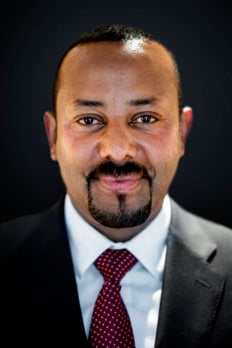Abiy Ahmed Ali
Biographical
 Abiy Ahmed was born in Beshasha, Ethiopia. As a young man, Abiy Ahmed participated in the armed struggle against Mengistu’s communist regime in Ethiopia and later served in the Ethiopian military. Abiy studied computer science, leadership and economics, graduating in 2017 with a doctorate in peace and conflict research at Addis Ababa University. A long-time political activist, he was elected to the Ethiopian parliament in 2010. He became prime minister of Ethiopia in 2018.
Abiy Ahmed was born in Beshasha, Ethiopia. As a young man, Abiy Ahmed participated in the armed struggle against Mengistu’s communist regime in Ethiopia and later served in the Ethiopian military. Abiy studied computer science, leadership and economics, graduating in 2017 with a doctorate in peace and conflict research at Addis Ababa University. A long-time political activist, he was elected to the Ethiopian parliament in 2010. He became prime minister of Ethiopia in 2018.
Abiy Ahmed Ali took up the post of Prime Minister of Ethiopia in April 2018. The country was ravaged by a protracted conflict with its neighbour, Eritrea, over a disputed border area. An international arbitration commission ruled in favour of Eritrea in 2002, but the Ethiopian government refused to accept the ruling. After 16 years of “no war, no peace” between the two countries, Abiy Ahmed broke the deadlock and accepted the decision. In September 2008, he and Eritrean President Isaias Afwerki signed a historic peace agreement.
Abiy Ahmed has also engaged in other peace and reconciliation processes in and around the Horn of Africa. In his own country, he granted an amnesty to political prisoners and abolished press censorship. He also focused on empowering women. In a short time, the country’s president, Federal Supreme Court president and half of the ministers in his government were women, including the Minister of Peace.
Democratisation poses serious challenges in a country with 100 million inhabitants and more than 80 different ethnic groups. In 2019, Ethiopia, a country with no tradition of free elections and democracy, was still racked by major internal conflicts. At the time Abiy Ahmed received the Nobel Peace Prize, there was considerable suspense as to whether he would succeed in fulfilling his promise of free and fair elections in 2020.
This autobiography/biography was written at the time of the award and later published in the book series Les Prix Nobel/ Nobel Lectures/The Nobel Prizes. The information is sometimes updated with an addendum submitted by the Laureate.
Nobel Prizes and laureates
Six prizes were awarded for achievements that have conferred the greatest benefit to humankind. The 14 laureates' work and discoveries range from quantum tunnelling to promoting democratic rights.
See them all presented here.
